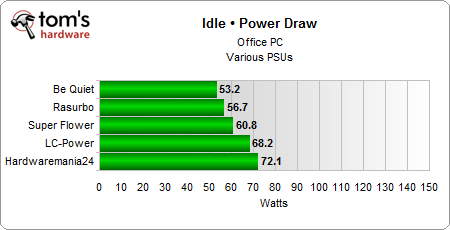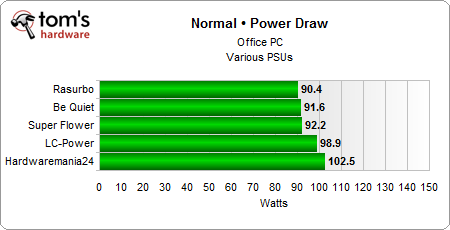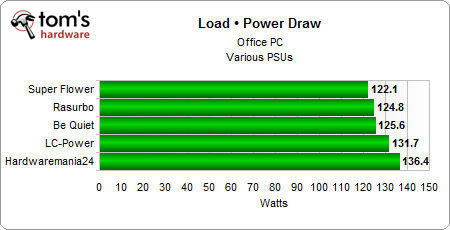Picking The Right Power Supply: What You Should Know
How does a power supply work? Why is it important to choose a sufficiently powerful and efficient model? We guide you through discussions of efficiency and tips for getting the best deal before we go on to explain why less can be more in the PSU market.
Example 1: The Office PC
Why you can trust Tom's Hardware
Test Case 1: Office PC
Here’s a look at our standard office PC.
Our goal is to find a suitable power supply for it. We’ll have to ask your forgiveness here, as this article originated with our German team. While some of the power supplies used by our colleagues may not be available in the U.S., they still serve to illustrate the point quite well.
Also, we were hoping to use Huntkey’s Jumper 300W 80 PLUS Gold as our standard. Sadly, the review sample we were promised got stuck somewhere between China and German customs and didn’t make it to the lab in time. That’s why Super Flower's 450W Golden Green is taking its place, despite being a bit on the beefy side for what we need. So, without further ado, here are our candidates:
| Manufacturer | Model | Certification | Price |
|---|---|---|---|
| Hardwaremania24 | Standard ATX 420W | None | $14 (£N/A / €9.90) |
| LC-Power | LC6350 Super Silent 350W | None | $28 (£37 / €19.90) |
| be quiet! | Pure PowerL7 300W | 80 PLUS | $45 (£N/A / €32.00) |
| Rasurbo | Real & Power RAP 350W | 80 PLUS | $49 (£N/A / €35.00) |
| Super Flower | Golden Green 450W | 80 PLUS Gold | $83 (£N/A / €59.00) |
Big Charts For Our Smallest System
Now for the big reveal. How do our various contenders stack up? Well, have a look for yourself. There are certainly some pronounced differences:
Nineteen watts separate the best and worst power supplies at idle, with be quiet! and Rasurbo taking the top spots. The Gold-certified Super Flower model places third, with the two cheapest PSUs landing last.
That ranking doesn’t change much when we look at a normal usage scenario, where the difference between first and last place shrinks to 11W. However, Rasurbo and be quiet! trade places, while the rest of the field stays unchanged.
Under load, the delta between our top performer and the worst offender increases to 14W, with Super Flower's submission taking the lead ahead of Rasurbo and be quiet!. Meanwhile, the super-cheap Hardwaremania24 PSU's efficiency curve starts to fall off again, exposing the component as a rebadged 250W model. If you want to try for 300W using a sub-par piece of hardware like that, keep a fire extinguisher handy.
Conclusion
In all three scenarios, the 80 PLUS-certified models take the top spots. Interestingly, the Gold-rated Super Flower PSU only takes first under a full load. As such, its higher price doesn't really seem worthwhile. Then again, it does get penalized somewhat by being the highest-capacity model in this group. Super Flower's big advantage is a semi-passive cooling mode. Under these loads, the fans don't spin up at all, making the Golden Green 450 W an interesting choice for quiet PCs.
Current page: Example 1: The Office PC
Prev Page The Power Window Is Important Next Page Example 2: Mid-Range Gaming PCGet Tom's Hardware's best news and in-depth reviews, straight to your inbox.

Aris Mpitziopoulos is a contributing editor at Tom's Hardware, covering PSUs.
-
abryant Archived comments are found here: http://www.tomshardware.com/forum/2916-56-picking-power-supply-knowReply -
pjmelect A few more words about active power factor correction. APFC won't save you money on your electric bill although the electric companies will love you for it as it minimizes loss over the power lines saving them money, it does however enable you to use a much lower rated battery backup system. A hypothetical example a computer that uses say 200W without APFC would require a backup system of 700W or much more to cope with the large peaks in current where as a power supply with APFC would require a backup system of 250W or so.Reply
Therefore APFC is only worthwhile if you were to use it with a battery backup system. -
turkey3_scratch Very well written article! Just one thing. You say:Reply
Regardless of whether the PC is idling or under full load, voltages may not deviate from their spec by more than five percent according to the ATX spec.
But the ATX specification seems to disagree. According to the spec, full load or "peak loading" allows 10% deviation from the nominal voltage for the 12V rail.
http://www.formfactors.org/developer/specs/Power_Supply_Design_Guide_Desktop_Platform_Rev_1_2.pdf
Also, Q about the power factor correction. It's probably the most difficult topic to understand. In this case, you say the load would be anything that used power. Are you talking about hardware like a GPU or the internals of the PSU like capacitors and such? Also, say the computer is putting load on the PSU. How is there idle current then? -
jossrik There have been quite a few instances in the past where you could get an XFX PSU 550w or so for 40$ or less with rebates. I know compared to more modern PSUs they may not stack up, but they used to be pretty decent. Ya, more often than not, the cheaper the PSU the worse the quality, but you really do need to do your homework.Reply
Budget PSU
https://www.youtube.com/watch?v=Ezk9OA7aKOE -
Aris_Mp The newest ATX spec defines 5% at peak load as well. The 10% is only for the -12V rail which is now optional. The newest ATX spec is confidential (dont know why)Reply -
cats_Paw While I can understand that having a beefy power supply on idle state wont be too efficient, its on loads where you want it as efficient as possible.Reply
Somehow, having a low efficiency under a 65W load is less expensive than low efficiency at 500W load, go figure :D.
-
cats_Paw In all fairness, a PC is not a self-maintenance Robot.Reply
If you want a PC to last a good 10-15 years you need to take care of it:
Clean dust, replace fans when they fail, replace thermalpaste, check your temperatures from time to time, not turn it on-off-on too fast, keep your Hard drives with some spare space and defraged if they are HDDs....
There is quite some work for a PC to keep their form, but its not like a human can lay down in bed eating cheese and drinking cola looking like a model either.
PSUs however have this strange aura of magic around them since some people vastly overestimate what power supply they need (I got a 700W TT one for a load of 320, go figure) and others buy things that are simply bad products, no matter how high the W are.
I did once burn a PC due to a bad PSU (and I even OCed the damn PC, went down in smoke.. I gotta say it was quite fun, but expensive), so I stay on the safe side (I just simply add an extra 20% for 12v rail amps as long as the price of a quality supply is not doubling).


